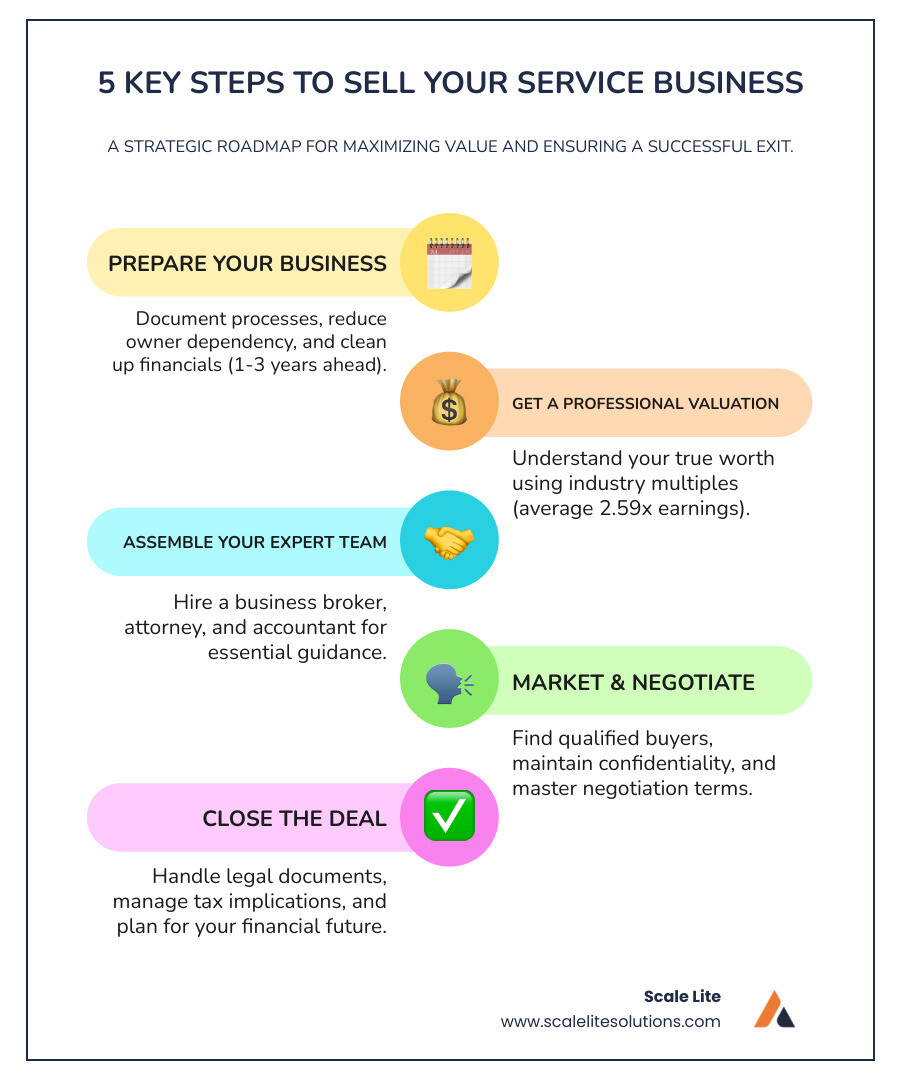
Ready, Set, Sell! Preparing Your Service Business for a Successful Sale

Why Service Business Owners Need a Strategic Exit Plan
Learning how to sell service business successfully is about strategic preparation, not just listing it for sale. Only 20-30% of businesses on the market actually sell, and many owners leave money on the table due to a lack of planning.
Quick Answer - The 5 Key Steps to Sell Your Service Business:
- Prepare Your Business (1-3 years ahead) - Document processes, reduce owner dependency, clean up financials.
- Get a Professional Valuation - Understand your true worth using industry multiples (average 2.59x earnings for service businesses).
- Assemble Your Expert Team - Hire a business broker, attorney, and accountant.
- Market and Negotiate - Find qualified buyers, maintain confidentiality, and negotiate terms.
- Close the Deal - Handle legal documents, manage tax implications, and plan your financial future.
Selling a service business is a complex transaction involving intangible assets like your reputation, systems, and customer relationships. The process can take over five months, but preparation should begin 1-3 years in advance.
The stakes are high. A well-prepared service business can command earnings multiples of 2-3.5x, while unprepared businesses sell for far less, if at all. This difference can mean hundreds of thousands of dollars.
As the founder of Scale Lite, I've seen in private equity what separates high-value exits from disappointing ones. The key to a successful sale is building a business that can thrive without you.

Phase 1: Prepare Your Business for Maximum Value
The foundation for a successful sale is laid years before you list your business. This preparation phase, which typically takes one to three years, is about changing your company into a turnkey operation that runs without your daily involvement. The goal is to maximize your sale value by increasing profits, building customer loyalty, and creating a business that buyers see as a low-risk, high-potential investment.

For comprehensive strategies on enhancing your business's appeal to buyers, check out our guide on Business Value Improvement.
Solidify Your Operations and Systems
Buyers pay a premium for businesses with documented processes. Create detailed standard operating procedures (SOPs) for all core functions, from client intake to project completion. These SOPs are your business's instruction manual, ensuring quality and consistency continue after you're gone.
Equally important is reducing owner dependency. A business that relies on you for all major decisions is a liability to a buyer. Build a strong management team and empower them to run daily operations. This, combined with strong employee retention, signals stability. Long-term employees hold valuable institutional knowledge and maintain client relationships, which are attractive assets to buyers.
To dive deeper into creating systems that work without you, explore our resources on Businesses That Run Themselves and Streamline Operational Processes.
Improve Your Financial Health and Record-Keeping
Clean financial records are non-negotiable. Buyers will scrutinize your books, so you need 3-4 years of pristine profit & loss statements, balance sheets, and tax returns. Work with an accountant to ensure accuracy and identify opportunities to improve profit margins. A profit-focused strategy is far more attractive than one that just chases revenue.
Organized financials build buyer confidence and speed up the due diligence process. Messy books create doubt and can kill a deal or lead to a lower offer.
For insights on leveraging your financial data strategically, visit our Data-Driven Business Strategy resource.
Boost Your Growth and Customer Base
Demonstrating consistent income and a strong customer base is your secret weapon. Recurring revenue models, such as monthly retainers or service contracts, are highly valued by buyers because they provide predictable income. This can command significantly higher valuation multiples than one-time project work.
Your marketing pipeline should also show systematic lead generation that isn't dependent on your personal network. Buyers want to see a machine that will keep producing new business.
Finally, focus on brand reputation and customer loyalty. As research from Harvard Business Review shows, retaining customers is 5 to 25 times cheaper than acquiring new ones. A business with high retention rates is more stable and profitable, making it a much more valuable asset.
To explore proven strategies for sustainable business growth, check out our Business Growth Strategy guide.
Phase 2: Determine Your Business's True Worth
After preparing your business, it's time to determine its value. This is a methodical process, not guesswork. Getting the valuation right is critical; pricing too high scares away buyers, while pricing too low leaves money on the table. Service businesses are valued based on their ability to generate predictable cash flow, their documented systems, and their intangible assets.

For a comprehensive look at maximizing your business's appeal to buyers, check out our guide on Business Value Improvement.
Understanding Service Business Valuation Methods
Service businesses are valued on their ability to generate cash. The two primary metrics are Seller's Discretionary Earnings (SDE) and Earnings Before Interest, Taxes, Depreciation, and Amortization (EBITDA).
- SDE is used for smaller businesses (typically under $1M in earnings). It represents the total financial benefit to the owner, calculated by taking the net profit and adding back the owner's salary, benefits, and other personal expenses run through the business.
- EBITDA is used for larger businesses. It measures pure operational performance by removing financing and accounting decisions from the profit calculation.
Once you have your SDE or EBITDA, you apply an industry multiple. The average earnings multiple for service businesses is 2.59, with most falling between 2 and 3.5. For example, a business with an SDE of $200,000 could be valued between $400,000 and $700,000. Revenue multiples are also considered, but earnings multiples carry more weight as they reflect profitability.
Gathering the Necessary Financial Documents
This is where your clean financial records pay off. Buyers will conduct due diligence and require at least three years of financial history. Be prepared to provide the following:
- Profit and loss (P&L) statements
- Balance sheets
- Tax returns
- Client contracts (especially recurring revenue agreements)
- Employee agreements
- Lease documents
- Asset lists
Having these documents organized and accurate will speed up the sale and build buyer confidence.
The Value of Intangible Assets and Recurring Revenue
Many of a service business's most valuable assets are intangible. Your brand reputation, customer relationships, and documented systems are critical drivers of value because they make the business transferable and scalable.
Of all these, recurring revenue is king. Buyers pay a premium for predictable income from monthly retainers and service contracts. This predictable cash flow can significantly increase your valuation multiple compared to one-off project revenue, potentially doubling your business's value.
This is why building scalable, repeatable processes isn't just good business—it's a wealth-building strategy. Learn more about creating systems that buyers love at Scalable Service Operations.
Phase 3: Navigating the Sale Process - How to Sell Your Service Business
With your preparation complete, it's time to put your business on the market. This phase involves finding qualified buyers, maintaining confidentiality, and negotiating terms. A misstep here can be costly, but with the right team and strategy, you can steer the process successfully.

This is where having a solid Business Exit Plan becomes your roadmap to success.
Assembling Your "Deal Team": Broker, Lawyer, and Accountant
Trying to sell a business alone is risky. Assemble a deal team to maximize your sale price and protect your interests:
- Business Broker: Manages the sale process, from valuation to marketing to finding buyers. A skilled broker often negotiates a higher price that more than covers their 10-15% commission.
- Business Attorney: Your legal shield. They draft confidentiality agreements (NDAs), review contracts, and ensure all legal details are handled correctly.
- Accountant: Manages financial due diligence, helps structure the deal to minimize taxes, and explains your financial story to buyers.
This team allows you to focus on running your business, which is critical as its performance during the sale process directly impacts its value.
Finding and Vetting Potential Buyers
Finding the right buyer is about quality, not quantity. Sources include online marketplaces like BizBuySell, your broker's professional network, and industry contacts such as competitors or key employees.
Maintaining confidentiality is critical. News of a sale can worry employees and customers. Always use a Non-Disclosure Agreement (NDA) before sharing sensitive information. You should also pre-qualify buyers to ensure they have the financial capacity to complete the purchase. This saves time and protects your confidential data from those who aren't serious.
Mastering Negotiations and Due Diligence
Successful negotiation is about more than just price; it's about creative deal structures. Start with a firm but fair price based on your professional valuation. Consider offering seller financing for a portion of the price. This can attract more buyers and lead to a higher overall sale price, as it signals your confidence in the business's future.
The due diligence period (typically 60-120 days) is when the buyer verifies your claims. They will scrutinize financials, contracts, and operations. Your preparation in Phase 1 will make this process smooth.
According to 2024 data, service businesses average 166 days on the market. Avoid common pitfalls like poor financial records, unrealistic pricing, high owner dependency, and breaches of confidentiality. Attempting this complex process without professional guidance is one of the biggest mistakes you can make.
Phase 4: Closing the Deal and Managing Your Future
Closing the deal is the moment you've been working toward, but the work isn't over. This final phase is about ensuring a clean, legally sound transfer of ownership and making smart decisions for your financial future.

How you handle this transition will determine your long-term financial security.
The Legal Side of Closing the Sale
The legal closing process involves several key documents. Your business attorney is essential to steer this paperwork and protect your interests.
- Letter of Intent (LOI): A non-binding document outlining the basic terms of the deal.
- Purchase Agreement: The most critical legal document, detailing the final price, payment structure, assets, liabilities, and warranties.
- Bill of Sale: Formally transfers ownership of business assets to the buyer.
- Non-Compete Clause: A standard clause preventing you from starting a competing business for a specific time and in a specific area.
- Transition Agreement: Outlines your role, if any, in helping the new owner after the sale.
Never attempt to handle these complex legal documents without professional guidance.
Understanding the Tax Implications
Proper tax planning can save you a significant amount of money. The profit from your sale is typically subject to capital gains tax. The structure of the sale also has major tax implications:
- Asset Sale: The buyer purchases individual assets. This can result in a mix of ordinary income and capital gains for you, potentially leading to a higher tax bill.
- Stock Sale: The buyer purchases the company's shares. This is often more tax-friendly for the seller, as the entire profit is typically treated as a capital gain.
Consult with a tax professional before finalizing the deal to structure it in the most advantageous way.
How to Handle the Profits After Selling Your Service Business
Once the deal is done, the challenge becomes managing your windfall wisely. Resist making major financial decisions immediately. A high sale price is meaningless if the money doesn't last.
Work with a financial planner to create a comprehensive plan. Key steps include:
- Pay off high-interest debt to free up cash flow.
- Invest for retirement, accounting for future expenses like health insurance that your business previously covered.
- Diversify your investments to manage risk.
Thoughtful management of your sale proceeds is the final step in ensuring your entrepreneurial journey provides the financial freedom you've earned.
Frequently Asked Questions about Selling a Service Business
Here are answers to common questions about how to sell service business successfully.
What's the biggest difference when selling a franchise service business?
Selling a franchise requires approval from the franchisor, who has the final say on the buyer. The franchisor dictates the rules, qualifications, and transfer process. You will also face transfer fees, which can be substantial. This adds a layer of complexity and time compared to selling an independent business, as you must coordinate closely with the franchisor throughout the process.
What are the most common pitfalls to avoid when selling a service business?
The biggest pitfalls are preventable. Avoid these common mistakes:
- Poor financial records: Messy books scare away serious buyers.
- Unrealistic asking price: Pricing too high will cause buyers to look elsewhere.
- High owner dependency: If the business can't run without you, buyers see a job, not an investment.
- Breaching confidentiality: News of a sale can destabilize your company. Always use NDAs.
- Not using a professional team: Trying to sell without a broker, lawyer, and accountant often leads to costly errors.
How long does the entire process of selling a service business typically take?
From listing to closing, expect six months to a year. The average time on the market in 2024 was 166 days. However, the total timeline is much longer because the crucial preparation phase should begin 1-3 years before you plan to sell. This preparation is what separates top-dollar sales from disappointing outcomes. The good news is that this work also improves your profits and reduces your stress as an owner in the meantime.
Conclusion
Successfully learning how to sell service business is about changing your company into a valuable, turnkey asset that runs without you. The difference between a strategic exit and a rushed sale can be hundreds of thousands of dollars.
Strategic preparation is everything. By focusing on documented operations, clean financials, recurring revenue, and reducing owner dependency, you create enterprise value that attracts premium offers. Well-prepared businesses command higher multiples and are part of the 20-30% of listings that actually sell.
Your exit strategy should begin years before you plan to leave. Each phase, from preparation to closing, builds on the last. At Scale Lite Solutions, we specialize in modernizing and automating service businesses to create the scalable operations that buyers seek. When your business runs on systems, not your personal involvement, you're not just selling a job—you're selling a profitable enterprise positioned for top dollar.
Learn how AI-Driven Workflow Automation can increase your company's value






